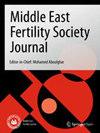Cannabidiol impairs sperm quality and function in adult mice
IF 1.3
Q4 REPRODUCTIVE BIOLOGY
引用次数: 0
Abstract
Considering the growing therapeutic use of cannabidiol as well as the presence of cannabinoid receptors in sperm and its possible genotoxic activity, the effect of cannabidiol on sperm quality and function was examined. Thirty male NMRI mice were randomly divided into three groups: control (no injection), sham (intraperitoneal (IP) injection of DMSO daily for 34 days), and cannabidiol (IP injection of cannabidiol 30 mg/ml daily for 34 days). Following 35 days after the last injection, sperm parameters, chromatin integrity (CMA3 staining), acrosome reaction (FITC-PNA method), fertility-related genes (IZUMO1, PLCζ), and blastulation rate of the embryos obtained from the oocytes fertilized with the mentioned sperms was investigated. Count, motility, and morphology of sperm were not significantly affected by cannabidiol. CMA3+ sperms (protamine deficiency) were significantly higher in the cannabidiol group compared to the control group (P = 0.03). The acrosomal reaction and fertility-related genes (IZUMO1, PLCζ) in the cannabidiol group did not differ significantly compared to the control group. Also, there was no significant difference between the cannabidiol group and the control group in the two-cell and the eight-cell stages but the rate of blastocyst formation was significantly lower in the cannabidiol group compared to other groups (P < 0.0001). Our results showed that cannabidiol leads to negative effects on the male reproductive system through an effect on sperm chromatin and the rate of reaching the blastocyst stage of the embryo.大麻二酚会损害成年小鼠的精子质量和功能
考虑到大麻二酚的治疗用途日益广泛,以及精子中存在大麻素受体及其可能的遗传毒性活性,本研究对大麻二酚对精子质量和功能的影响进行了研究。30 只雄性 NMRI 小鼠被随机分为三组:对照组(不注射)、假阳性组(每天腹腔注射二甲基亚砜,连续 34 天)和大麻二酚组(每天腹腔注射大麻二酚 30 毫克/毫升,连续 34 天)。最后一次注射 35 天后,对精子参数、染色质完整性(CMA3 染色)、顶体反应(FITC-PNA 法)、生育相关基因(IZUMO1、PLCζ)以及用上述精子受精的卵母细胞所获胚胎的胚胎着床率进行了研究。精子的数量、活力和形态没有受到大麻二酚的明显影响。与对照组相比,大麻二酚组的 CMA3+ 精子(原胺缺乏症)明显较高(P = 0.03)。大麻二酚组的顶体反应和生育相关基因(IZUMO1、PLCζ)与对照组相比没有显著差异。此外,在两细胞期和八细胞期,大麻二酚组与对照组无明显差异,但与其他组相比,大麻二酚组的囊胚形成率明显降低(P < 0.0001)。我们的研究结果表明,大麻二酚通过影响精子染色质和胚胎进入囊胚期的速度,对男性生殖系统产生负面影响。
本文章由计算机程序翻译,如有差异,请以英文原文为准。
求助全文
约1分钟内获得全文
求助全文
来源期刊

Middle East Fertility Society Journal
REPRODUCTIVE BIOLOGY-
CiteScore
2.80
自引率
0.00%
发文量
32
审稿时长
45 weeks
 求助内容:
求助内容: 应助结果提醒方式:
应助结果提醒方式:


